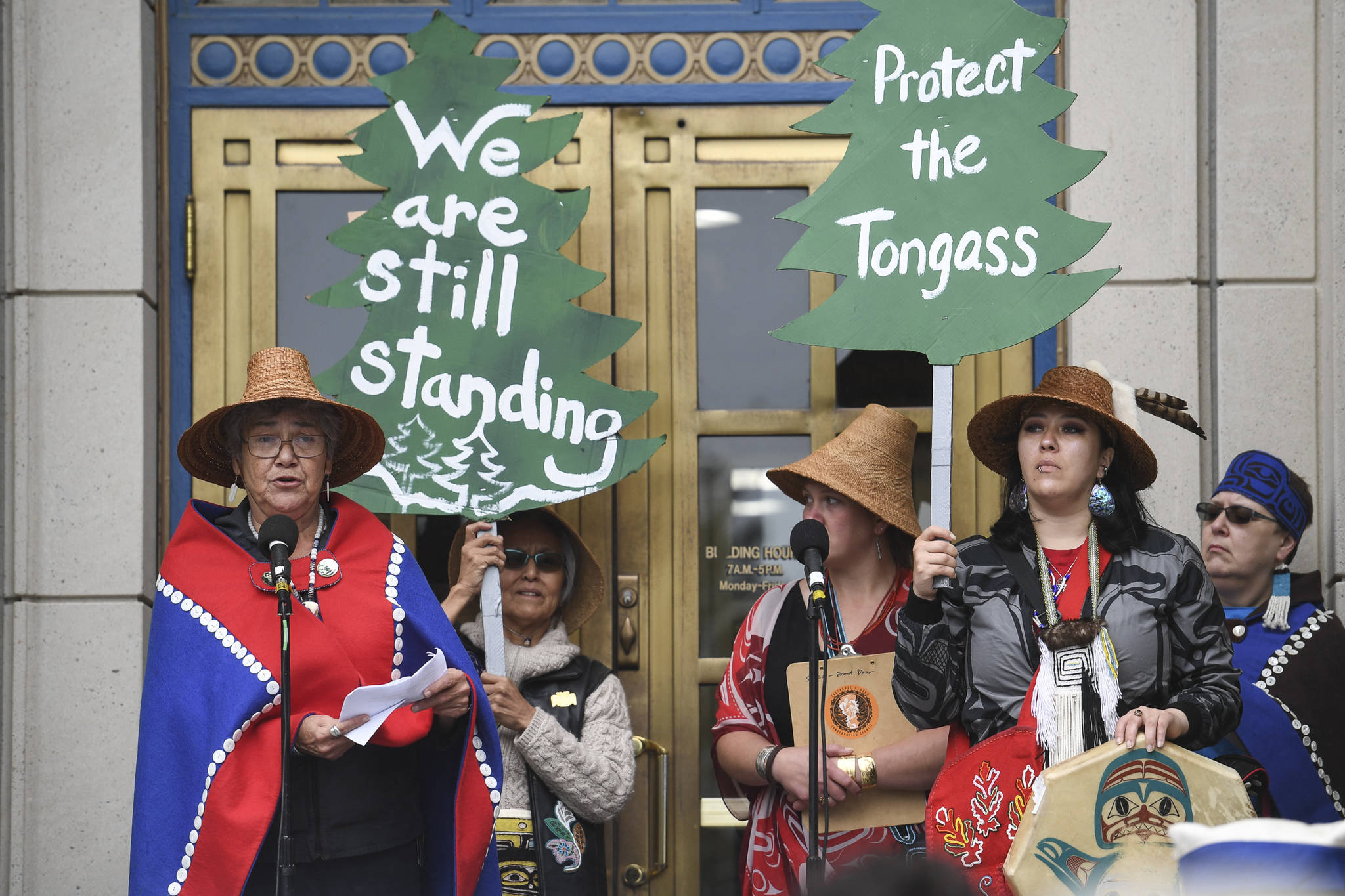The block in front of the Alaska State Capitol on Saturday morning temporarily turned into a cardboard rainforest.
Turn Out for the Tongass Rally participants — roughly 150 in all — bobbed and waved tree- and salmon-shaped picket signs to the pounding drums of Yees Ku Oo, a multicultural dance group that helped kick off the hourlong rally in support of the 2001 National Roadless Rule.
The U.S. Forest Service is in the process of developing a state-specific program for the Alaska Roadless Rule that could open parts of the Tongass National Forest to development. The Forest Service established the Roadless Rule to protect roadless forests, which constitute about one-third of all National Forest System lands.
The battle about the roadless rule has been going on for almost two decades, ever since it was established in 2001.
“The Tongass is still considered the crown jewel of the national forest system: 500 miles, north to south, 70,000 inhabitants in 32 communities, but we still know there are wild bears, wolves, coyotes, whales, beavers everywhere you turn,” Rep. Sara Hannan, D-Juneau, said to the crowd. “Even in urban Juneau we say to our tourists, ‘Yeah, that’s another eagle, yeah, whatever,’ and we forget that in most of America seeing an eagle and a bear and a salmon is the thing of National Geographic on TV.”
[Photos: Turn Out for the Tongass Rally]
Tlingit activist and Women’s Earth and Climate Action Network (WECAN) member Wanda Culp spoke of the bond between Alaska Natives and traditional lands.
“We are inseparable,” Culp said.
Culp recounted her visit to the nation’s capital to voice her support of the roadless rule.
[Frank Murkowski has a vision for Southeast. It includes roads and timber]
“We hit 16 offices in two days, it was quite the experience,” Culp said during the rally. “We also did hit Lisa Murkowski’s office, who is telling everybody on the Hill that Alaskans are for weakening the roadless rule, voting it down. We were there literally filling everybody’s ears with the truth of the people. Not any corporation, not any industry and certainly not the State of Alaska who is infantile compared to us.”
[Opinion: Frank Murkowski’s vision for Southeast Alaska takes us in the wrong direction]
A handful of youth spelled out “NO ACTION” with painted picket signs, while others could be spotted at the back of the crowd. Deanna Hobbs, 21, was one of the Southeast Alaska Conservation Council staffers at the rally. In an interview, Hobbs echoed some of Culp’s concerns over the positions of Alaska’s elected officials.
“They need to look at what the people actually care about because it’s not normal, everyday Alaskans that are trying to get the exception,” Hobbs said. “It’s the big politicians that get money from the timber industries and there’s real people that are negatively affected. Not just regular city folk, but also indigenous people.”
Sens. Dan Sullivan and Lisa Murkowski are both supportive of increasing resource development in Southeast. Sen. Sullivan told the Empire in March he supports making changes to the roadless rule, and Sen. Murkowski wrote an opinion piece in the Ketchikan Daily News with the same stance.
Hobbs said expanding the logging industry could negatively impact other sectors of Alaska’s economy like tourism and fishing.
“Those are negatively affected by mass logging,” Hobbs said. “I personally am very passionate about conservation and I’m not a big fan of logging in the first place.”
One of the more rousing speeches came from former City and Borough of Juneau Assembly member Kate Troll, who touched on the role of the Tongass in combating climate change. As the largest remaining temperate rainforest and largest national forest in North America, she talked about the Tongass as a “carbon storer.”
“For the sake of the climate crisis we’re in, we need to leave these carbon sinks in place, leave the roadless rule alone,” Troll said. “President Trump may not care about the state of our climate crisis, but we do. The Tongass is not Trump’s Tongass.”
“Whose home is the Tongass?” Troll asked to the crowd.
“Ours!!” the crowd responded.
• Contact reporter Nolin Ainsworth at 523-2272 or nainsworth@juneauempire.com.

